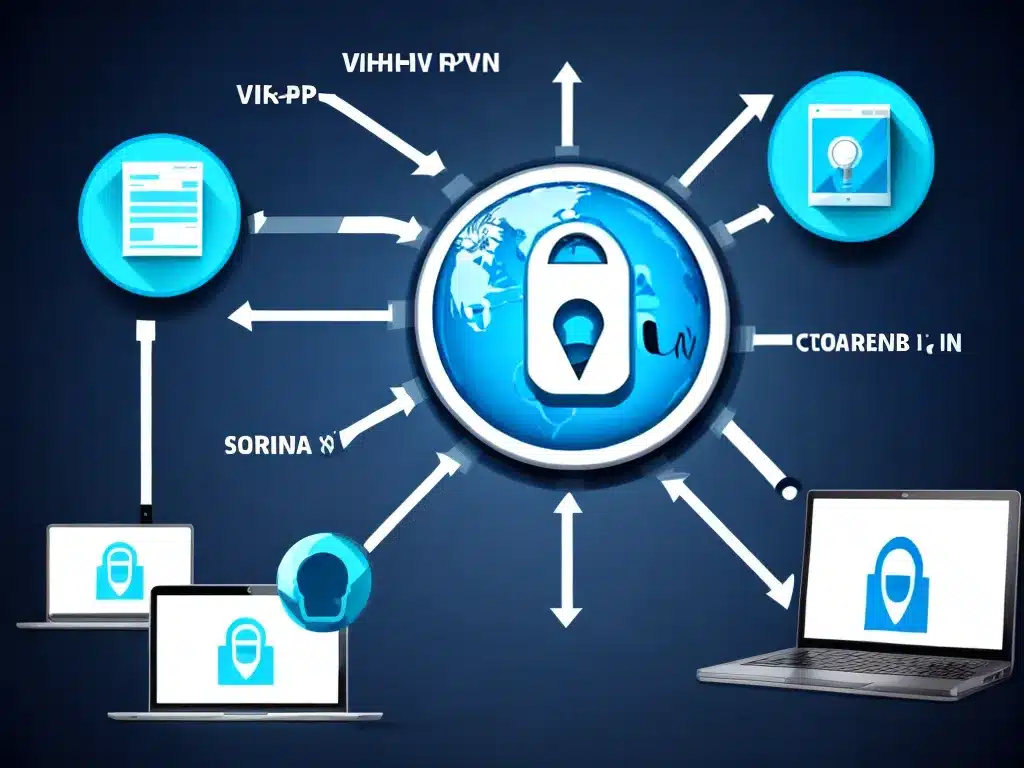
Using a VPN (virtual private network) for your business can provide many benefits, but also comes with some potential drawbacks to consider. Here is an in-depth look at the pros and cons of using a business VPN.
What is a VPN?
A VPN creates a secure, encrypted connection over a less secure network, like the public internet. It allows devices across the network to send and receive data privately by tunneling connections through the public internet.
Some key aspects of how a VPN works:
-
Encryption – All data is encrypted as it leaves the device, travels over the internet, and arrives at the target network. This prevents snooping of sensitive information.
-
Anonymity – The original IP address is masked, so online activities are harder to trace back to the source.
-
Access Control – VPNs provide access to network resources even when physically remote. Specific permissions can be granted on a per-user basis.
-
Data Integrity – VPN connections are very difficult for outsiders to tamper with or alter data within. This safeguards integrity of information transmitted.
Benefits of Using a Business VPN
Enhanced Security
-
VPN encryption protects company and customer data from prying eyes. This is extremely important when using public Wi-Fi or transmitting sensitive information.
-
Remote employees can access company data and apps safely through an encrypted VPN tunnel. This expands secure access beyond the office.
-
VPNs prevent IP addresses from being exposed publicly, adding a layer of anonymity.
Increased Flexibility
-
Employees can work from home or remote offices, and still access all their normal company applications and files.
-
Team members can collaborate securely via a shared workspace, no matter where they are located physically.
-
Resources within a private company network can be accessed globally, as long as there is an internet connection.
Compliance and Regulations
-
VPNs help satisfy data security precautions mandated by regulations like HIPAA for health care or PCI DSS for payment processors.
-
VPN logging provides auditing and reports on network activities, which aids regulatory compliance.
-
Segmenting access via VPN improves compliance with data privacy regulations.
Potential Drawbacks of Business VPNs
Setup and Maintenance
-
Setting up the VPN server, configuring accounts and access rules, and installing client apps takes IT effort.
-
Maintaining the VPN infrastructure requires ongoing monitoring and management by IT teams.
-
Remote troubleshooting client connection issues or resetting accounts can consume help desk resources.
Performance Impact
-
Encrypting data and routing it through a VPN tunnel requires extra processing overhead. This can potentially slow network speeds.
-
Connectivity issues and latency across the public internet can sometimes degrade performance.
-
If the VPN server is underpowered or congested, it may bottleneck traffic and connections.
Cost Considerations
-
Business-class VPN servers have an upfront licensing/subscription cost, especially for enhanced features.
-
Extra infrastructure may be needed to handle VPN traffic, driving up hardware costs.
-
There is additional employee time required for IT teams to configure and manage the VPN setup.
Key Factors to Consider
Deciding if implementing a business VPN makes sense depends on weighing factors like:
-
How much sensitive data do you transmit or access remotely?
-
Does your industry have regulatory data security requirements?
-
Do you have distributed teams needing access to internal apps and resources?
-
Is your IT department able to handle VPN setup, configuration and maintenance?
-
How much mobility and flexibility do employees need when working?
Carefully evaluating your specific security needs, business processes, compliance goals and resources can determine if the benefits of a VPN outweigh the downsides for your organization. Some infrastructure changes may also help maximize benefits while minimizing drawbacks. For instance, upgrading to high-speed fiber internet or a faster VPN server appliance could improve performance.
Conclusion
VPNs provide a more secure and flexible way for modern businesses to operate. But they also come with complexity and costs that require planning. Look at your company’s unique risk profile, operations and capabilities to decide if implementing a business VPN makes sense, and if the benefits will outweigh the potential disadvantages. With the right preparation and setup, a VPN can be a valuable technology investment.












